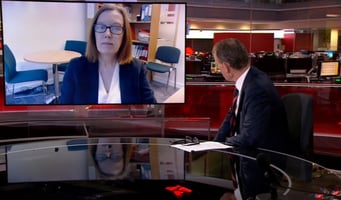“I was taken by surprise”.
It was billed as a “world exclusive interview”.
But having watched Piers Morgan’s interview with the beleaguered family of Captain Tom, you wonder whether it was a good idea.
The TalkTV interview featured tears, a request to stop filming, revelations and resulted in more questions than answers.
And plenty of media training lessons.
The interview saw Hannah Ingram-Moore, her husband Colin, son Benji and daughter Georgia talk about the charity set up in the lockdown icon’s name.
It is a charity that has been in crisis mode for some time, with a Charity Commission inquiry into its accounts and a planning dispute about a building built in Captain Tom’s name.
And the interview was probably considered a shot at redemption and a chance to clear the family name.
The interview started with the family discussing the abuse they had received, and it was impossible not to feel sympathy for them.
But the public does not like to feel that it has been fooled, and the sympathy did not last long.
The most dramatic part of the exchange came when the presenter probed the profits of one of the family’s businesses – Club Nook - had made.
The company was set up to trademark the Captain Tom name and protect his intellectual property.
Mr Morgan said it was a “red flag” that the family had kept the £800,000 the business had made.
He said: “The public will think ‘Hang on a second, the family has set up this company to trademark the Captain Tom name, to sell products – beers, spirits, greeting cards and so on – and kept the cash. Why are the charities not getting the cash?’”
Mrs Ingram-Moore replied: “My father was part of all those discussions. And that company is there, in essence, to protect him. And also, from his perspective, that we had a right to live as well as we could live. We are hard workers. We are not shirkers. We put everything into everything. And we are recompensed. And that’s fair.”
As Mr Morgan probed this area further, she complained it was a “really unfair line of questioning.” And her husband asked for the interview to stop.
“Stop filming because this is really unfair”, Mrs Ingram-Moore added.
Her husband asked to explain off-camera and added they would not continue with the interview otherwise.
Fantastic footage for viewers. But not a good look for those appearing in front of the camera. During our media training courses, we stress the importance of spokespeople maintaining their composure when faced with awkward and uncomfortable questions.
As soon as spokespeople lose that composure, it shows those watching that they are uncomfortable. And people will wonder what they want to hide.
As it was a pre-recorded interview, the family may have thought the footage of them requesting filming stop would not be aired.
But, as we’ve shown in our media training blogs many times before, it often is because it adds to the drama around the story.
Mr Morgan said the break in filming resulted in a “lengthy off-the-record conversation” – something that also raises some media training flags and not an approach we would recommend.
When filming eventually resumed, Mr Ingram-Moore said the majority of the money (95 per cent) had come from three books Captain Tom wrote – a different response to what had previously been offered.
Asked why the book money had not gone to charity, Captain Tom’s daughter said: “They were my father’s books. It was honestly such a joy for him to write them. But they are his books. His wishes were that the money would sit in Club Nook.
And she added that “the books were never anything to do with the charity.”
Would they go back and do the same thing if they had the opportunity?
“It was his money, his income,” Mr Ingram-Moore said. “Just because the charity happened to be called Captain Tom Foundation, doesn’t mean his assets are all suddenly owned by the charity.”
If the money did come from the books and Captain Tom had wanted his family to keep it, you might wonder why this was not said when the subject was first raised, rather than claiming the questions were “unfair”.
Perhaps the answer is that the response seems to conflict with what Captain Tom wrote in his books.
As Mr Morgan highlighted after that section of the interview aired, the prologue of one of the books says: “Astonishingly at my age, with the offer to write this memoir I have also been given the chance to raise even more money for the charitable foundation now established in my name.”
After the interview, we found this direct quote from Capt Tom in the prologue to his autobiography:
— Piers Morgan (@piersmorgan) October 12, 2023
'Astonishingly at my age, with the offer to write this memoir I have also been given the chance to raise even more money for the charitable foundation now established in my name' https://t.co/L90oJiuLCS
Another lengthy section of the interview focused on a controversial spa pool added to a building created in the Captain Tom name at the family’s home.
The luxury pool has been the cause of much anger, and Mr Morgan made several attempts to coach them to what he thought would be the best answer in the court of public opinion – that they would get rid of the pool.
”I come back to when I walk around here (the building), I feel my heart swell about this amazing guy and I love what you have begun to do as a tribute to him,” he said.
“I can imagine people wanting to come and see it. But when I first walk in, the first thing I see is a luxurious spa pool that has nothing to do with Captain Tom at all.
“And yet you used the Captain Tom Foundation name to get it. That’s why I’m surprised, given I’ve asked this a few times, you don’t just say, ‘Actually we get it, that’s going to go regardless of what the council says’. I’ll give you one last chance.”
Mrs Ingram-Moore replied: “I think though that I can’t possibly answer that before we, as a family, sit down and discuss it.”
She went on to add that the “ageing population” would be able to use the pool for Pilates.
When Mr Morgan suggested that was “not the main motivation” and that the family had wanted “a nice spa pool”, Mrs Ingram-Moore said: “Of course” – a reminder of the dangers of agreeing with what the journalist says.
"When I first walk in, the first thing I see is a luxurious spa pool. That's got nothing to do with Captain Tom."
— Piers Morgan Uncensored (@PiersUncensored) October 12, 2023
Piers Morgan questions the lockdown hero's family over the pool they used his foundation to get planning permission for.@piersmorgan | @TalkTV | #PMU pic.twitter.com/XEAsnI3PWw
There was another hint of media training around the “optics” of what Ms Ingram-Moore was saying when the conversation moved on to being paid £18,000 for an appearance at an award ceremony in her father’s name, while the charity received a £2,000 donation.
At one point, he said: “I don’t want to tell you how to answer the questions because I’m the one asking them, but that answer sounds like you just wanted the cash.”
Mrs Ingram-Moore said: “The reality is I have to work for a living.”
She added: “It was done with love and with trying to ensure the community benefitted, and the Captain Tom Foundation benefitted. And yes, I got paid.”
As Mr Morgan suggested in his questions, it is hard to imagine the “I need to work” line resonating with the public when she was already being paid £85,000 as CEO of the charity. Or that it was done “with love” winning much support from people counting the pennies during a cost-of-living crisis.
Would it not be better to say, “I made a mistake, that money should have gone to the charity.”?
"Why are you getting paid £18,000 and keeping £16,000 of it?"
— Piers Morgan Uncensored (@PiersUncensored) October 12, 2023
Piers Morgan questions Hannah Ingram-Moore over money she was paid for taking part in the Captain Tom Awards.@piersmorgan | @TalkTV | #PMU pic.twitter.com/ilnIjiSC7M
There was a lot more focus on Ms Ingram-Moore’s salary. She insisted she had never 'asked' for £85,000-a-year. She also said she had not demanded the proposed £100,000 salary that was blocked by the Charity Commission.
And she admitted that she regretted taking the job. She said: “At the time, it felt like the only thing to do because without the injection from the family, what would it become? We had this incredible legacy. Our desire as a family is to ensure that legacy gives the greatest positive social impact that it can. You know, in hindsight, I wish I had never done it. But the foundation would have been much worse off for it. The problem is that what has come since has practically destroyed it.”
With the news emerging that the foundation is “likely to close down” since the interview was aired, quite how it could have been worse off without her leadership is anyone’s guess.
The interview reminded me of the interview Prince Andrew did with Newsnight – what was seemingly set up to clear their name added to the PR disaster.
Here are a few of the headlines it created:
The interview lacked contrition. There seemed to be limited understanding of the optics around their decisions.
And crucially, there appeared to be a lack of preparation for the tough questions that would be asked. The Club Nook section of the interview, in particular, will stay in the memory for a long time – criticising the questions, asking for filming to stop and then coming up with a new answer that starts to crumble almost immediately.
Mr Morgan had previously featured Captain Tom on his Life Stories programme. Maybe the family felt that meant he might go easier on them. If so, they were mistaken.
The words “in hindsight” were used a lot by Ms Ingram Moore in this interview. Perhaps, in hindsight, the interview was not a great idea.
Media First are media and communications training specialists with over 35 years of experience. We have a team of trainers, each with decades of experience working as journalists, presenters, communications coaches and media trainers.
Click here to find out more about our media training.
Subscribe here to be among the first to receive our blogs.




